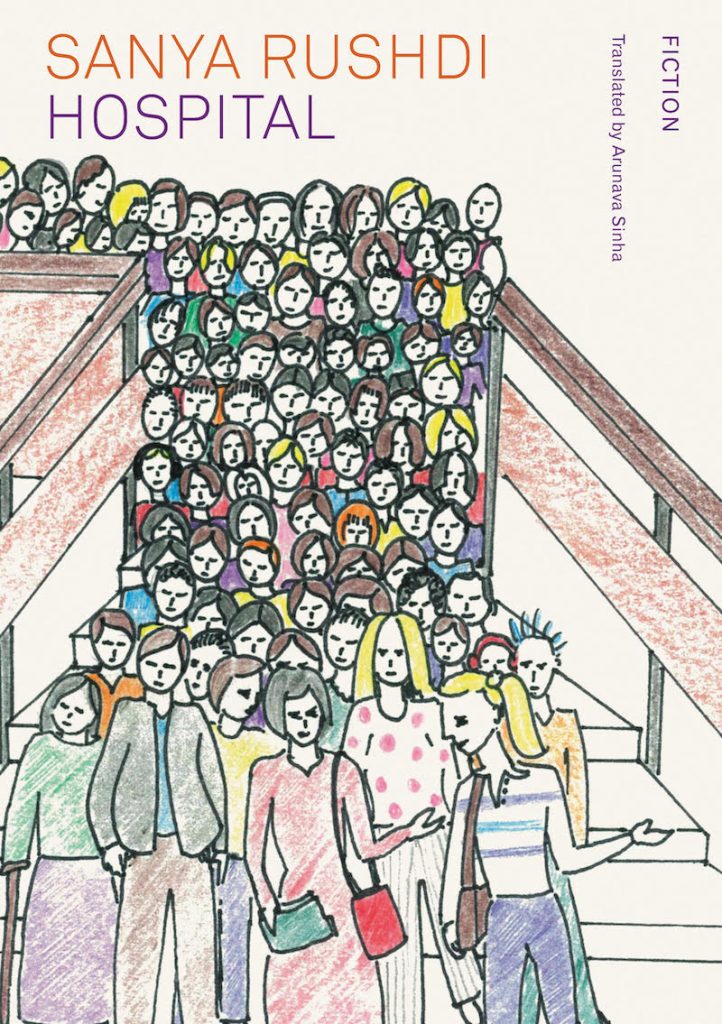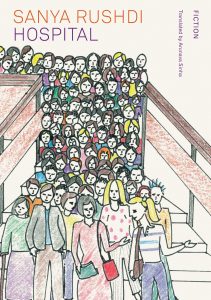Transcript: Sanya Rushdi at the launch of Hospital

Sanya Rushdi’s debut novel Hospital was published in Australia in June 2023, and launched at Readings State Library in Melbourne. Narrated in the first person, the book is a literary account of a woman living with psychosis, and is based on Rushdi’s own experiences. Read a transcript of the speech presented by Rushdi at the launch here.
Dear Audience,
Peace be upon you!
What a way to spend a Friday night, aye? I mean, you could have spent the night with friends and family. Perhaps watching a movie, or watching Friday night sports or cooking up a big meal for the dinner party. Instead, you decided to be here at my book launch! I am humbled, honoured and grateful. Thank you for making the time to be here.
Let me first warn you of the fact that I am an extremely bad oral communicator. So please forgive my shortcomings.
You may be saying that: “how can that be even possible? You wrote an entire book for goodness’ sake!”
To that, I just want to say that: “Yes, I wrote a book called Hospital, but, as Vygotsky said in Thought and Language:
…the mental functions which form written speech are fundamentally different from those which form oral speech. Written speech is the algebra of speech. It is a more difficult and a more complex form of intentional and conscious speech activity.
Of course, there are differences other than intentionality and level of consciousness between oral and written speech. For example, oral speech usually occurs between two or more people, and the sentences can be left incomplete for the other people to complete them, which, I think forms some kind of mental connection between people, whereas, written speech is usually more expanded and even monotonous.
However, there are different ways of reducing the monotony in written pieces. Written pieces can be written out as different characters speaking to one another, for example. That’s what novels tend to do. They use dialogue, which, I too, have used extensively in Hospital.
In the novel called Hospital, the protagonist receives a diagnosis of schizophrenia after her third episode of psychosis. Psychosis or schizophrenia is something that most people find interesting if not fascinating. It’s one of those colorful illnesses that keep normal people wondering about what’s going on in the affected individual’s mind. There are other, less colorful mental illnesses too, like clinical depression, which is perhaps more devastating and debilitating than most cases of psychosis. Yet, psychosis steals all the public attention – negative attention, to be clear. I experienced both, and want to see one in light (or should I say darkness) of the other.
If there is anyone in the audience who is experiencing, or knows someone who is experiencing some kind of mental illness, know that this darkness does not last forever. It subsides in due time. Often, change starts with something very little, like keeping a diary and writing in it whatever comes to mind. That’s how my writing journey began. During my depression, my elder sister Luna used to ask me write whatever would come to my mind, and afterwards, I could read it out to her if I wanted to. I mostly wanted to, because during major depression, one is in constant need of human interaction. The TV doesn’t do, the internet doesn’t do too much, it’s the actual presence of other people that leads to healing. I remember my younger sister Ifa and her family used to make time to take me out to the beach (which I used to find very soothing) or recite for me from the Quran, or dine with me, or whatever they could, to keep me company. I remember Ifa’s sister-in-law Farhana Snigdha and her family visiting me often. And of course my parents, Sultana Rushdi and Ali Ahmed Rushdi, my ex and my extended family did for me what was beyond my imagination, beyond what I could ever expect! But I just want to say that even if you can’t have all the support that I had, just starting from something very little is often the start of big changes.
Hey, I never thought I’d write a novel. But it’s the writing habit that I built up by keeping a diary, together with the help and encouragement of my beloved Tanvir Ahmed Chowdhury, my publisher and friend Bratya Raisu, and my friend Monzurul Ahsan Olee that led to the completion of the original, Bengali version of this novel called Hospital.
So, how did I go about writing the novel? A couple of months after returning home from the hospital, I became very eager to share my story with a caring ear. So, I gave a few pages of writing to a friend of mine, Bratya Raisu, who is a publisher and editor for a couple of online magazines (and also a renowned poet, writer and artist). Raisu asked me to develop my story into a novel, because he thought it had all the material for a good novel. I was hesitant to start writing a novel so he asked me to give him some chapter headings – just one to two lines of what can be expected in each chapter. I did that, and upon writing the first chapter, it was published in shahitya.com, and subsequently chapter by chapter there. Although I didn’t end up sticking to the chapter headings, it was a rough guide to start with. Each chapter just flowed from the last spontaneously and naturally afterwards.
Later, after the book was published in Bengali, my elder sister Luna sent a copy to Arunava Sinha, who is a friend of hers and is a renowned translator in India, the UK and the US. Arunava read the book and expressed interest in translating it into English, which was a very humbling and happy experience for me. Translating, at his level is a big thing. I’ve read somewhere that ‘writers write for local readers, whereas translators translate for universal readers’. Following Arunava’s translation, the novel received international attention. The English version of the book was published by Seagull Books, and the wonderful Giramondo Publishing Company in Australia, working with whom – my publishers Ivor Indyk, Evelyn Juers, Nick Tapper and the entire team including Kate, Aleesha and others who are working behind the scene, has been an absolute pleasure and honour!
As shown in the novel, psychosis can occur without depression and vice versa, just like obsessive compulsive disorder (OCD) can occur with or without anxiety disorder. Although mainstream psychology and psychiatry do study the aetiology of different mental illnesses, they do so in fragmented ways. Vygotsky compares this method to studying a fragmented water molecule. As we know, a water molecule is composed of two hydrogen atoms and one oxygen atom. Both hydrogen and oxygen are combustive in isolation, but when they are within a water molecule together, as H2O, their characteristics change. Indeed, the characteristics of a water molecule is completely different to that of its isolated atoms.
I think, in a similar way, the different mental illnesses can be compared to see whether they occur together in certain personalities and mind sets, races and nationalities etc., and in cases of multiple mental illnesses, and multiple incidents within a person, how they develop from one illness to another and what happens in-between the incidents other than just ‘resistance to medication’. I think the aetiology of mental illnesses should be studied using more non-mainstream, naturalistic and qualitative methods.
Looking back at my own experiences, I found that in clinical depression, I felt as if I was unable to do the things I previously enjoyed, because there was an internal block that excluded me from feeling any pleasure. Time passed very slowly and there was a frequent thought of death, not because I was grieving something, but because I felt no pleasure in anything at all!
Psychosis is a bit different to clinical depression. For example, during my three incidents of psychosis, time passed so quickly, that I felt as if I could not keep up with the “tasks that needed to be done.” This speed of passing time, however, did not happen from enjoyment, but from a constant agitation, restlessness and irritation due to a feeling of persecution in my first two incidents and a feeling of responsibility and accountability in the third. The last incident seemed to be without much agitation and restlessness, as was shown in Hospital.
So, in psychosis, one feels as if one is unable to do the things one enjoys or thrives in because there is an external pressure of some sort to do otherwise.
But wait a minute. Doesn’t this description of psychosis apply to life in the present world in general too? Is mental illness and mental health a matter of two different languages used by the ‘normal’ and the affected individual? That’s something that Hospital hints at, and it is for you to find out.
Thank You!


